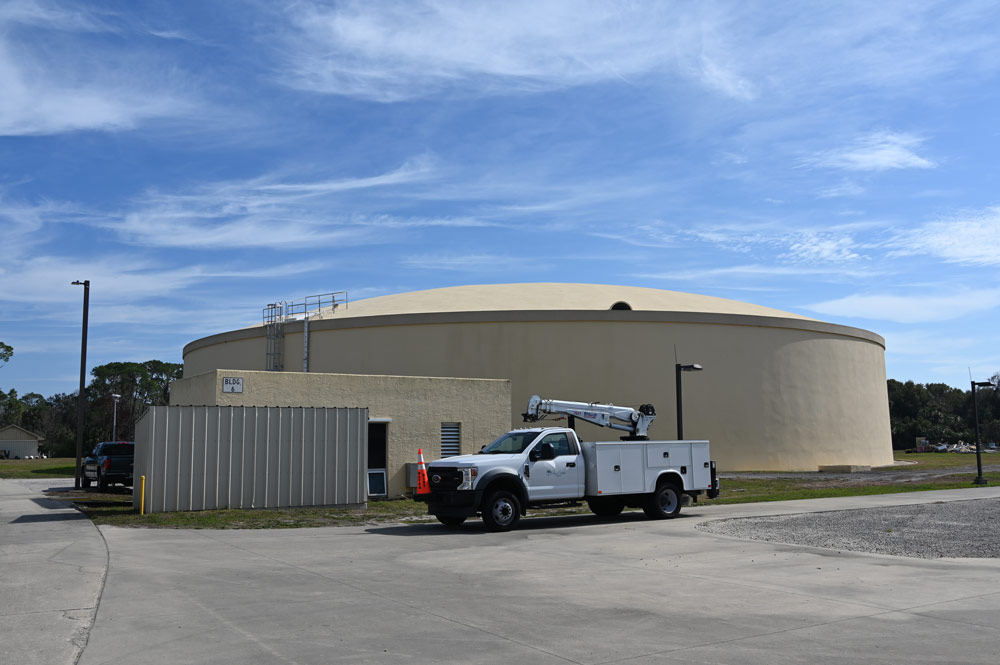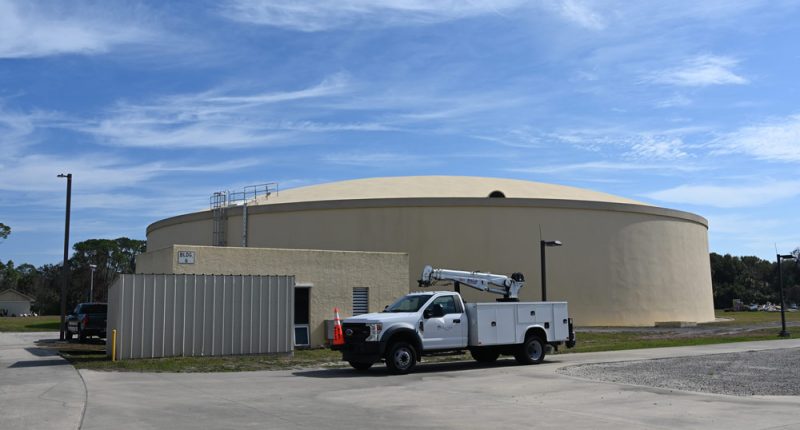
Three of the Palm Coast City Council’s four members returned from a lobbying trip to Tallahassee last week with some potential successes to help pay for the city’s utility-infrastructure needs despite legislative appropriations far more constrained than they’d been the previous two years.
Council members Theresa Pontieri, Charles Gambaro and Ty Miller took part in the trip, with Interim City Manager Lauren Johnston and Chief of Staff Jason DeLorenzo. Mayor Mike Norris did not go, telling the Observer he had other “stuff” to do and that the three council members who went would have matters in hand.
Two Palm Coast-specific appropriation bills have cleared legislative committees–one to help pay for an equalization or EQ, tank at Waste Water Treatment 1, and one to help fund the plant’s modernization (what’s referred to as Advanced Water Treatment). The city is under a state consent order to significantly improve the plant’s capacity and means of treatment. The plant in the Woodlands is the older of the city’s two.
The plant is regularly over capacity during big rain events as floodwaters overwhelm it. It still functions and processes every gallon, but the filtering process is not as rigorous. An equalization tank with a capacity of 6 million gallons would give the plant a buffer between storm-water surges and the amount of effluent running through the system at any one time, thus “equalizing” capacity. An EQ tank would cost upwards of $10 million, but can be built relatively quickly and immediately address the main capacity issue at WWTP 1. Modernizing the plant would cost far more and take longer.
Though the combined appropriations add up to a little over $5 million, or half the original request, Sen. Tom Leek, the Volusia County Republican whose district includes all of Flagler County, suggested to the council members not to focus on the current amount, which may change in Flagler County’s favor during the bill-reconciliation process ahead.
Still, the modest amounts contrast with the last two years’ bounty, when the city reaped some $150 million in appropriations thanks to a combination of once-in-a-lifetime factors: the Legislature was flush with federal aid money from the Covid years, and Flagler County had the benefit of its own representative, Paul Renner, as House Speaker, and its senator, Travis Hutson, chairing the appropriations committee. Both were term-limited.
Leek has been telling local officials that “member appropriations” have been cut from just under $2 billion to somewhere between $600 million and $700 million, with every county and community competing for its share. That made the personal appearances of local officials in Tallahassee more critical.
“Hopefully because we were able to talk to them about the needs of our infrastructure-related projects, especially our utilities, they heard that loud and clear,” Miller said.
It also helped that the council just approved the largest utility-rate increase in the city’s history, along with the largest coming bond issue in the city’s history, both to finance a more-than-half-billion-dollar utility infrastructure improvement plan.
“The decision by the council to invest in the future, in the city’s infrastructure, made a tremendous difference in our discussions with our state legislators,” Gambaro said, “because at this point we don’t just have our hand out. As a team we have made a difficult decision to raise our utility rates so we can move forward and make the improvements that are required for our residents.” Notably, Norris had been the lone dissenting vote in that decision, reversing course after voting with the majority on first reading. He changed his mind after deciding that he would not approve of a rate increase separate from a building moratorium.
Pontieri’s goal, she said, was to impart on state legislators the importance the city places on its utility infrastructure as a driver of economic development. “I feel like I walked away from there with them fully understanding the importance of that, which is what does give me hope,” Pontieri said. “I think that they realize we need to ensure that infrastructure is prioritized if we are going to take Palm Coast to the next level, as far as its economic development is concerned.”
It was in fact during the council members’ meeting with Rep. Sam Greco, who replaced Renner, that they all got word of the two appropriations clearing committees.
The trio of council members also met with Department of Environmental Protection officials. DEP has its own funding stream, separate from member-specific legislative appropriations. Communities can apply for grants to tap into those funds. “In our meeting with DEP, it was very clear that there are a lot of municipalities and counties vying after a limited pot of money,” Pontieri said. But the state agency “really gave us some good information with regards to what projects we should be focusing on for grant purposes versus what projects we should be focusing on for appropriation purposes.”
For example, DEP grants have been favoring Advanced Water Treatment projects in particular. And a focus on DEP spending in South and Central Florida is shifting to the northeast, favoring Flagler, “so that we can have some of the grant opportunities that we’ve been excluded from,” Pontieri said.
A less heralded benefit to Palm Coast and Flagler County this year: for the first time since 2014, no bill was filed to scrap or diminish local control over vacation rentals, as was attempted every year for the past 11 years. Last year the governor vetoed one such bill, perhaps sending the message to the industry that he would do so again if one were filed this year. Palm Coast approved its own vacation-rental regulations just months ago. Flagler County approved its own in 2014, and has been fighting off legislative attempts to override them since.
While the council’s trio was in Tallahassee, press reports and a Flagler Buzz video continued to underscore Norris’s grievances with the council–namely, Gambaro’s appointment, which he considers illegitimate though it was cleared by the city attorney–and the mayor’s series of allegations of improprieties in the administration at City Hall.
The three council members have no interest in themselves lending legitimacy to the claim about the Gambaro appointment. “This kind of interferes with what we’re here to do, which is our job, to work with the city and for the residents,” Miller said. All three are reserving judgment regarding an ongoing investigation of Norris’s own conduct toward staff at City Hall. “The best thing is to wait for the facts and kind of move forward from there rather than getting ahead of that,” Miller said.
But Pontieri is concerned about some of the other allegations Norris is making, whether it’s city staff polling council members outside of meetings to line up votes, sunshine issues or trusting the city manager. But if that’s the case, Pontieri said, “if there is really misbehavior happening that goes against organizational roles or the charter, then they should be discussed from the dais.”






